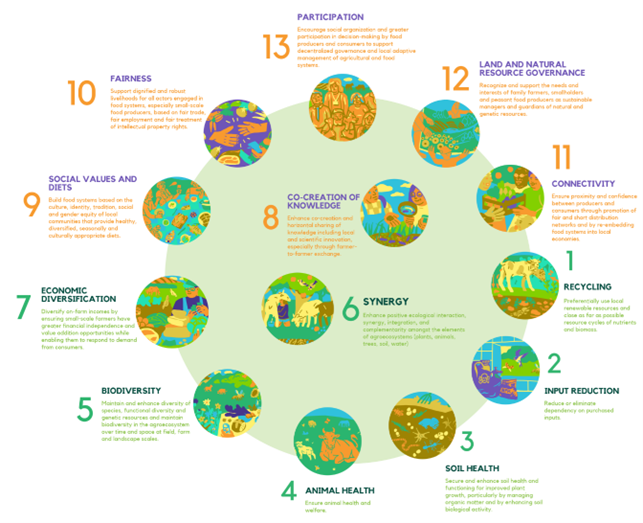Agroecology is “an integrated approach that simultaneously applies ecological and social concepts and principles in the design and management of food and agricultural systems” and that “seeks to optimize the interactions between plants, animals, humans and the environment while taking into account the social aspects that must be addressed for a sustainable and equitable food system.”
In its report published in 2019, the High Level Panel of Experts on Food Security and Nutrition (HLPE-FSN) of the Committee on World Food Security (CFS) developed the 13 Principles of Agroecology.

These principles are aligned with the 10 Elements of Agroecology endorsed in 2019 by FAO’s 197 members, following a multi-stakeholder consultation process initiated in 2015.
AICS has signed the Declaration of Commitment joining the UN Coalition for the Transformation of Food Systems through Agroecology (or Agroecology Coalition) on February 07, 2022.
The Agroecology Coalition was established in September 2021 on the sidelines of the UN Food Systems Summit. It has approximately 240 members to date, including 48 governments.
The goal of the Coalition is to accelerate the transformation of food systems through agroecology, guided by the 13 principles of agroecology defined by the High-Level Panel of Experts (HLPE) of the Committee on World Food Security (CFS) and the 10 elements of agroecology adopted by the 197 members of FAO in December 2019.
Recently, the AE Coalition has adopted a new strategy for 2024-2030, which is scheduled to be launched on June 27, 2024 at IFAD, Rome.
The Coalition’s 2024-2030 strategy takes into account the convergence of international policies on climate, biodiversity and food systems (e.g. Nationally Determined Contributions – BDCs, National Biodiversity Strategies and Action Plans – NBSAPs, National Action Plans – NAPSs -, Country Food Systems Pathways) and reflects the multidimensional approach in the 13 principles.
The work of the Coalition is to support the transformation of food systems through agroecology and the implementation of National Pathways, developed by each country under the UNFSS, facilitating the process of co-creation and knowledge exchange, promoting greater investment in agroecology, supporting market channels for agroecology, and seeking political involvement and greater degree of commitment to agroecological transformation.
Office VI participates in the various Working Groups (WGs) of the Coalition, on Implementation, Policy, Finance and Investment, and Research and Education. It presents case studies from initiatives that AICS funds and implements in Partner Countries.
Office VI is authorised to use the Agroecology Funding Portfolio Assessment Tool, or Agroecology Matrix, to verify the responsiveness of Initiatives to the 13 Agroecology principles, which is useful to design new initiatives from an agroecological perspective.
The 13 agroecological principles (see brochure) express the multidimensionality of this approach by contemplating specific aspects related to social, environmental, and economic issues (biodiversity, soil health, governance of soil and land, reduction of external inputs, economic diversification, participation, synergy, social values and diets, and co-creation of knowledge).